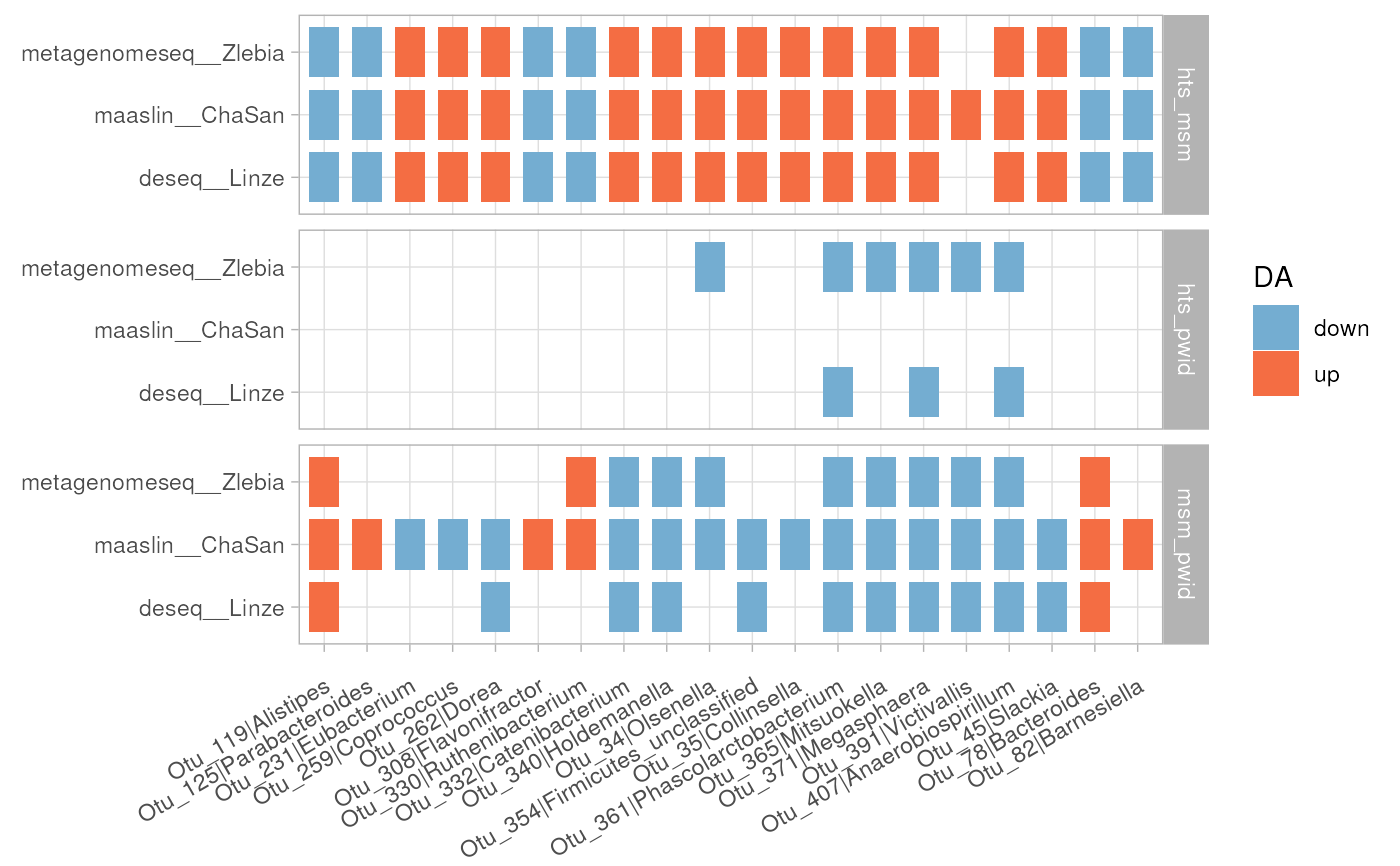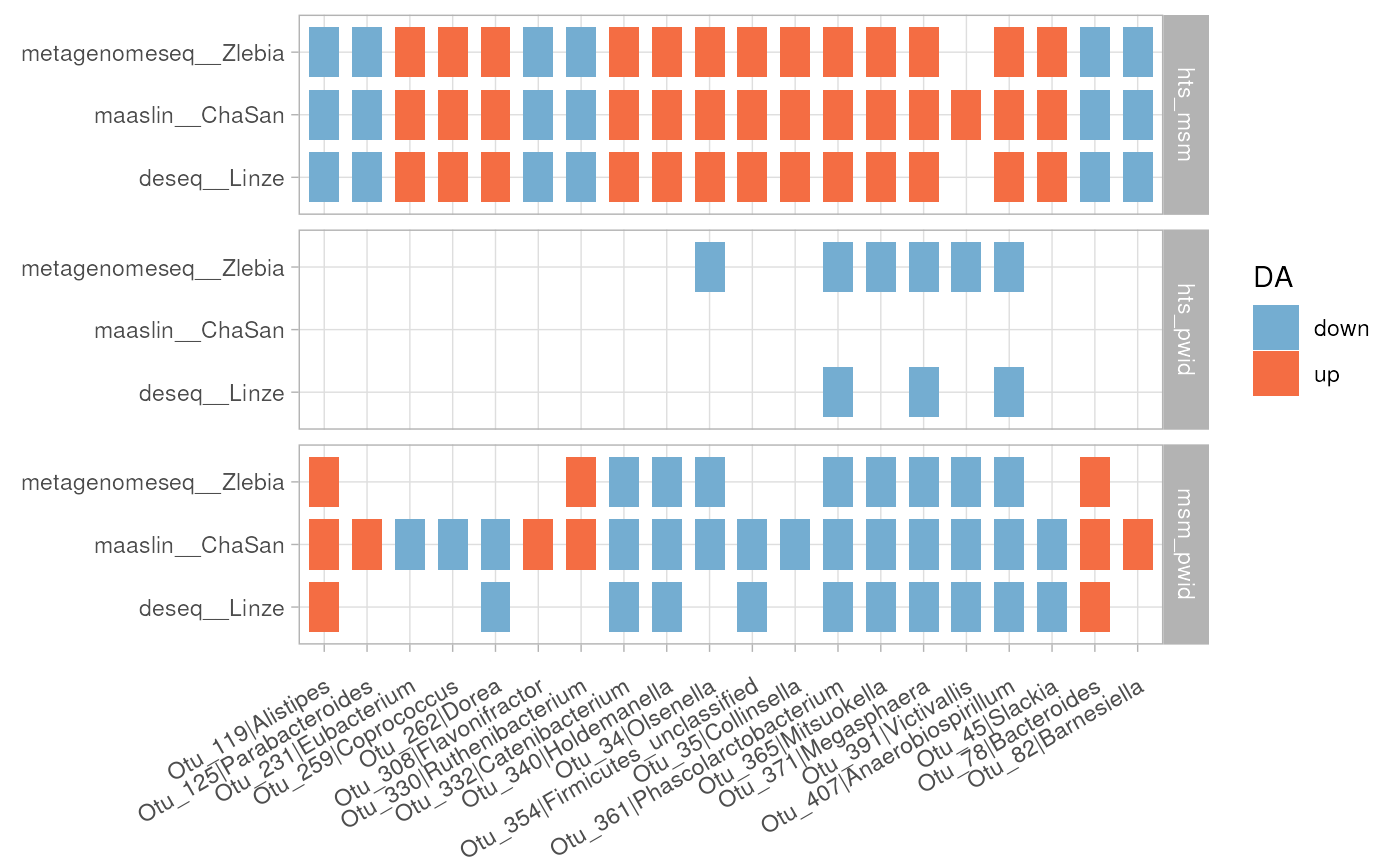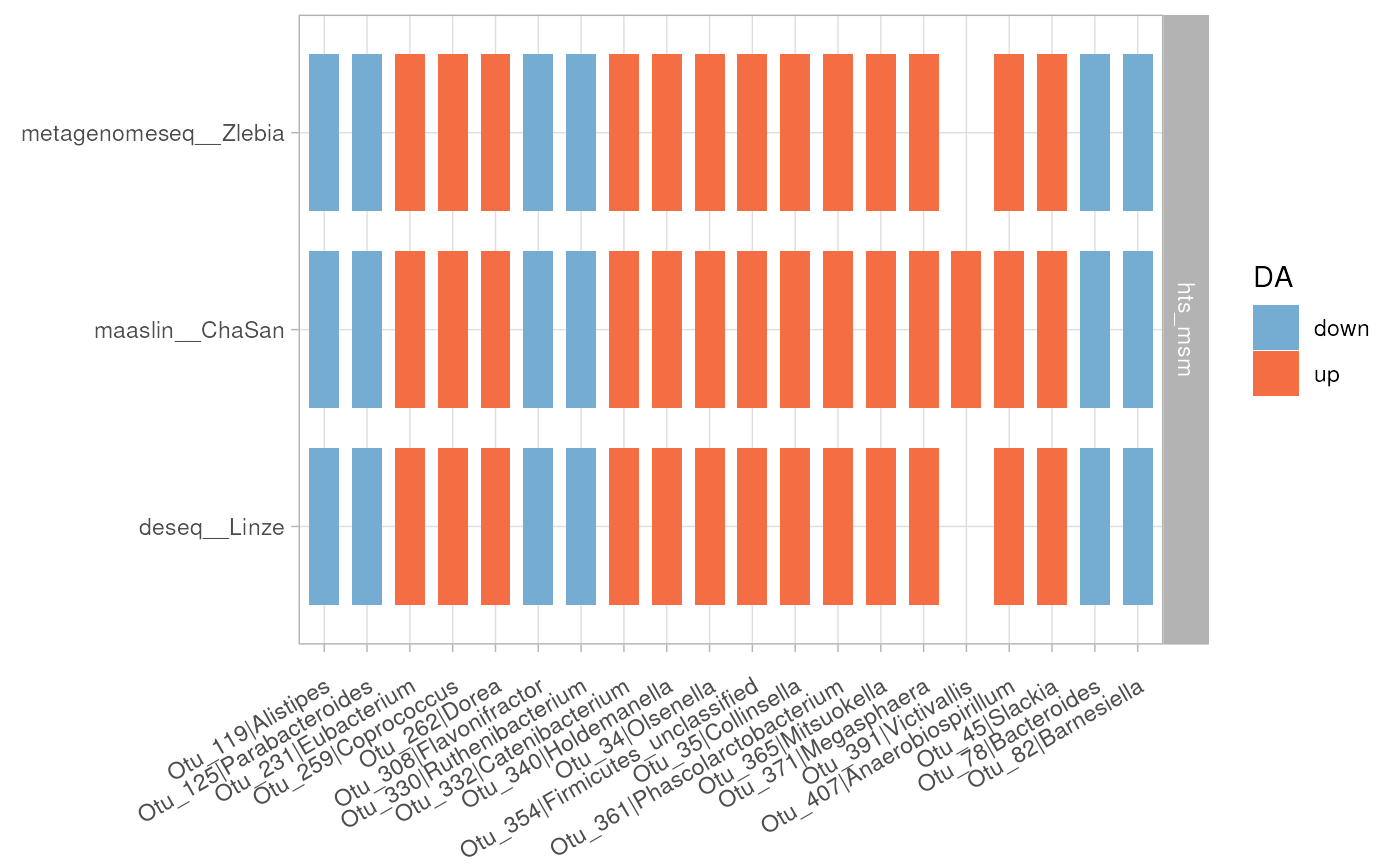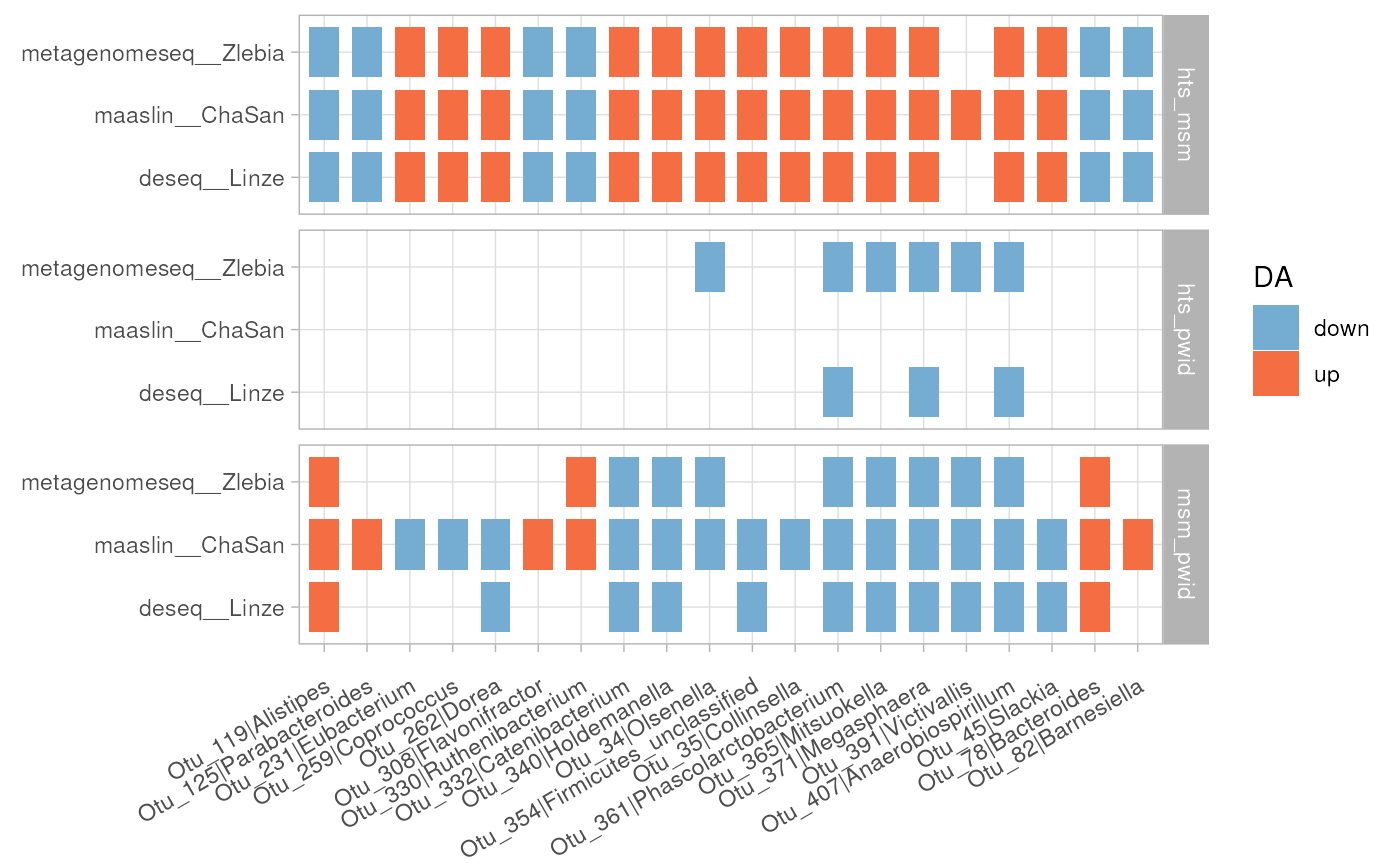Plots number of differentially abundant features mutually found by defined number of methods, colored by the differential abundance direction and separated by comparison.
Usage
mutual_plt(
rec,
count_cutoff = NULL,
comparisons = NULL,
steps = steps_ids(rec, type = "da"),
top_n = 20
)
# S4 method for class 'Recipe'
mutual_plt(
rec,
count_cutoff = NULL,
comparisons = NULL,
steps = steps_ids(rec, type = "da"),
top_n = 20
)
# S4 method for class 'PrepRecipe'
mutual_plt(
rec,
count_cutoff = NULL,
comparisons = NULL,
steps = steps_ids(rec, type = "da"),
top_n = 20
)Arguments
- rec
A Recipe or Recipe step.
- count_cutoff
Indicates the minimum number of methods in which an OTU must be present (Default: NULL). If count_cutoff is NULL count_cutoff is equal to
length(steps_ids(rec, "da")) * 2 / 3.- comparisons
By default, this function plots all comparisons. However, if the user indicates the comparison or comparisons of interest, only the selected ones will be plotted.
- steps
Character vector with step_ids to take in account. Default all "da" methods.
- top_n
Maximum number of taxa to represent. Default: 20.
Examples
data(test_prep_rec)
## Running the function returns a tile plot,
mutual_plt(test_prep_rec)
#> ℹ count_cutoff set to 1
#> ! Taxa present in selected methods are greater than the cutoff top_n = 20
#> ℹ The top 20 significant taxa with the greatest overlap between methods will be used
 ## The count_cutoff indicates the minimum number of methods in which an OTU
## must be present. By default the value is equal to
## length(steps_ids(rec, "da")) * 2 / 3 but it is customizable.
mutual_plt(
test_prep_rec,
count_cutoff = length(steps_ids(test_prep_rec, "da"))
)
#> ! Taxa present in selected methods are greater than the cutoff top_n = 20
#> ℹ The top 20 significant taxa with the greatest overlap between methods will be used
## The count_cutoff indicates the minimum number of methods in which an OTU
## must be present. By default the value is equal to
## length(steps_ids(rec, "da")) * 2 / 3 but it is customizable.
mutual_plt(
test_prep_rec,
count_cutoff = length(steps_ids(test_prep_rec, "da"))
)
#> ! Taxa present in selected methods are greater than the cutoff top_n = 20
#> ℹ The top 20 significant taxa with the greatest overlap between methods will be used
 ## A single comparisons can be plotted through the comparison parameter.
mutual_plt(test_prep_rec, comparisons = c("hts_msm"))
#> ℹ count_cutoff set to 1
#> ! Taxa present in selected methods are greater than the cutoff top_n = 20
#> ℹ The top 20 significant taxa with the greatest overlap between methods will be used
## A single comparisons can be plotted through the comparison parameter.
mutual_plt(test_prep_rec, comparisons = c("hts_msm"))
#> ℹ count_cutoff set to 1
#> ! Taxa present in selected methods are greater than the cutoff top_n = 20
#> ℹ The top 20 significant taxa with the greatest overlap between methods will be used
 ## If you want to exclude a method for the plot, you can remove it with the
## step parameter. In the following example we eliminate from the graph the
## results of maaslin.
mutual_plt(test_prep_rec, steps = steps_ids(test_prep_rec, "da")[-1])
#> ℹ count_cutoff set to 1
#> ! Taxa present in selected methods are greater than the cutoff top_n = 20
#> ℹ The top 20 significant taxa with the greatest overlap between methods will be used
## If you want to exclude a method for the plot, you can remove it with the
## step parameter. In the following example we eliminate from the graph the
## results of maaslin.
mutual_plt(test_prep_rec, steps = steps_ids(test_prep_rec, "da")[-1])
#> ℹ count_cutoff set to 1
#> ! Taxa present in selected methods are greater than the cutoff top_n = 20
#> ℹ The top 20 significant taxa with the greatest overlap between methods will be used
 ## mutual_plt function needs a PrepRecipe. If you pass a a non-PrepRecipe
## the output is an error.
data(test_rec)
err <- testthat::expect_error(mutual_plt(test_rec))
err
#> <error/rlang_error>
#> Error in `mutual_plt()`:
#> ! This function needs a PrepRecipe!
#> • Run prep(rec) and then try with mutual_plt()
#> ---
#> Backtrace:
#> ▆
#> 1. └─pkgdown::build_site_github_pages(new_process = FALSE, install = FALSE)
#> 2. └─pkgdown::build_site(...)
#> 3. └─pkgdown:::build_site_local(...)
#> 4. └─pkgdown::build_reference(...)
#> 5. ├─pkgdown:::unwrap_purrr_error(...)
#> 6. │ └─base::withCallingHandlers(...)
#> 7. └─purrr::map(...)
#> 8. └─purrr:::map_("list", .x, .f, ..., .progress = .progress)
#> 9. ├─purrr:::with_indexed_errors(...)
#> 10. │ └─base::withCallingHandlers(...)
#> 11. ├─purrr:::call_with_cleanup(...)
#> 12. └─pkgdown (local) .f(.x[[i]], ...)
#> 13. ├─base::withCallingHandlers(...)
#> 14. └─pkgdown:::data_reference_topic(...)
#> 15. └─pkgdown:::run_examples(...)
#> 16. └─pkgdown:::highlight_examples(code, topic, env = env)
#> 17. └─downlit::evaluate_and_highlight(...)
#> 18. └─evaluate::evaluate(code, child_env(env), new_device = TRUE, output_handler = output_handler)
#> 19. ├─base::withRestarts(...)
#> 20. │ └─base (local) withRestartList(expr, restarts)
#> 21. │ ├─base (local) withOneRestart(withRestartList(expr, restarts[-nr]), restarts[[nr]])
#> 22. │ │ └─base (local) doWithOneRestart(return(expr), restart)
#> 23. │ └─base (local) withRestartList(expr, restarts[-nr])
#> 24. │ └─base (local) withOneRestart(expr, restarts[[1L]])
#> 25. │ └─base (local) doWithOneRestart(return(expr), restart)
#> 26. ├─evaluate:::with_handlers(...)
#> 27. │ ├─base::eval(call)
#> 28. │ │ └─base::eval(call)
#> 29. │ └─base::withCallingHandlers(...)
#> 30. ├─base::withVisible(eval(expr, envir))
#> 31. └─base::eval(expr, envir)
#> 32. └─base::eval(expr, envir)
#> 33. ├─testthat::expect_error(mutual_plt(test_rec))
#> 34. │ └─testthat:::expect_condition_matching_(...)
#> 35. │ └─testthat:::quasi_capture(...)
#> 36. │ ├─testthat (local) .capture(...)
#> 37. │ │ └─base::withCallingHandlers(...)
#> 38. │ └─rlang::eval_bare(quo_get_expr(.quo), quo_get_env(.quo))
#> 39. ├─dar::mutual_plt(test_rec)
#> 40. └─dar::mutual_plt(test_rec)
## mutual_plt function needs a PrepRecipe. If you pass a a non-PrepRecipe
## the output is an error.
data(test_rec)
err <- testthat::expect_error(mutual_plt(test_rec))
err
#> <error/rlang_error>
#> Error in `mutual_plt()`:
#> ! This function needs a PrepRecipe!
#> • Run prep(rec) and then try with mutual_plt()
#> ---
#> Backtrace:
#> ▆
#> 1. └─pkgdown::build_site_github_pages(new_process = FALSE, install = FALSE)
#> 2. └─pkgdown::build_site(...)
#> 3. └─pkgdown:::build_site_local(...)
#> 4. └─pkgdown::build_reference(...)
#> 5. ├─pkgdown:::unwrap_purrr_error(...)
#> 6. │ └─base::withCallingHandlers(...)
#> 7. └─purrr::map(...)
#> 8. └─purrr:::map_("list", .x, .f, ..., .progress = .progress)
#> 9. ├─purrr:::with_indexed_errors(...)
#> 10. │ └─base::withCallingHandlers(...)
#> 11. ├─purrr:::call_with_cleanup(...)
#> 12. └─pkgdown (local) .f(.x[[i]], ...)
#> 13. ├─base::withCallingHandlers(...)
#> 14. └─pkgdown:::data_reference_topic(...)
#> 15. └─pkgdown:::run_examples(...)
#> 16. └─pkgdown:::highlight_examples(code, topic, env = env)
#> 17. └─downlit::evaluate_and_highlight(...)
#> 18. └─evaluate::evaluate(code, child_env(env), new_device = TRUE, output_handler = output_handler)
#> 19. ├─base::withRestarts(...)
#> 20. │ └─base (local) withRestartList(expr, restarts)
#> 21. │ ├─base (local) withOneRestart(withRestartList(expr, restarts[-nr]), restarts[[nr]])
#> 22. │ │ └─base (local) doWithOneRestart(return(expr), restart)
#> 23. │ └─base (local) withRestartList(expr, restarts[-nr])
#> 24. │ └─base (local) withOneRestart(expr, restarts[[1L]])
#> 25. │ └─base (local) doWithOneRestart(return(expr), restart)
#> 26. ├─evaluate:::with_handlers(...)
#> 27. │ ├─base::eval(call)
#> 28. │ │ └─base::eval(call)
#> 29. │ └─base::withCallingHandlers(...)
#> 30. ├─base::withVisible(eval(expr, envir))
#> 31. └─base::eval(expr, envir)
#> 32. └─base::eval(expr, envir)
#> 33. ├─testthat::expect_error(mutual_plt(test_rec))
#> 34. │ └─testthat:::expect_condition_matching_(...)
#> 35. │ └─testthat:::quasi_capture(...)
#> 36. │ ├─testthat (local) .capture(...)
#> 37. │ │ └─base::withCallingHandlers(...)
#> 38. │ └─rlang::eval_bare(quo_get_expr(.quo), quo_get_env(.quo))
#> 39. ├─dar::mutual_plt(test_rec)
#> 40. └─dar::mutual_plt(test_rec)
